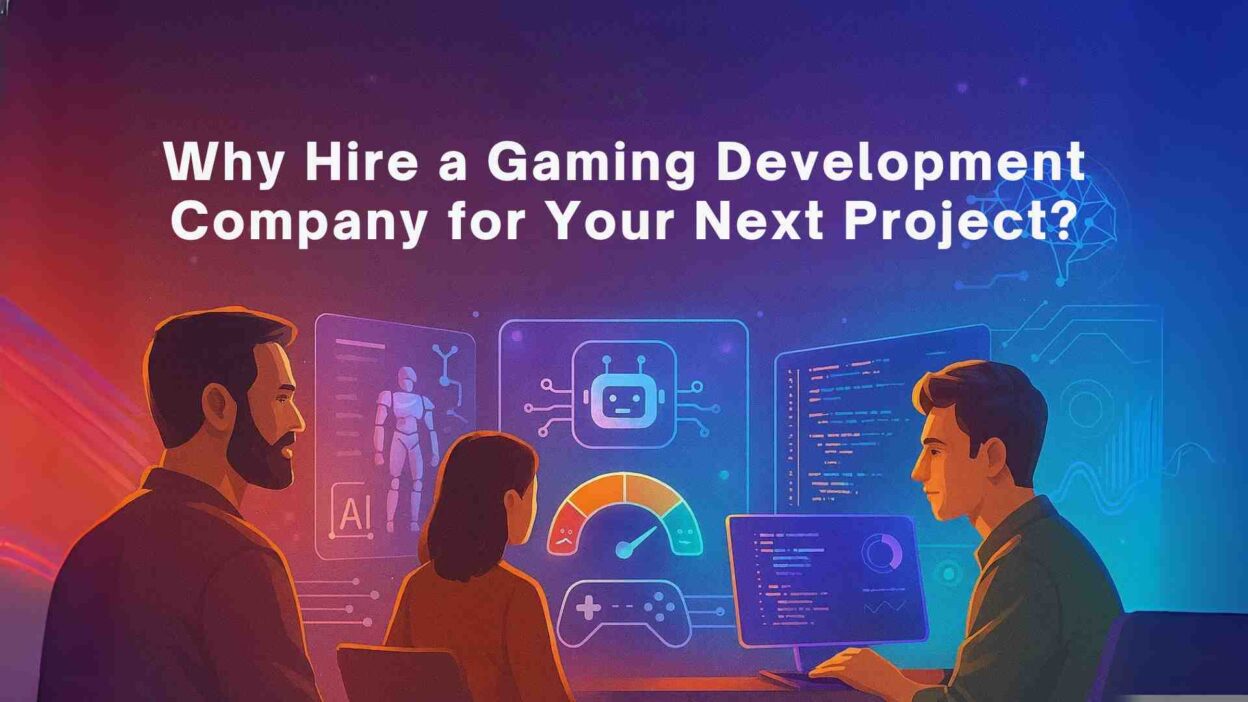TL;DR The gaming industry generates billions of dollars annually. Everyone wants a piece of this lucrative market. Creating a successful game requires specialized skills and experience. Most entrepreneurs underestimate the complexity involved.
Table of Contents
Building a game from scratch is extremely challenging. Technical hurdles appear at every development stage. Design decisions impact player engagement directly. Marketing strategies determine whether your game gets noticed.
Many project owners face a critical decision early on. Should you build an internal team or outsource development? The answer depends on your specific circumstances. Hire a gaming development company and you gain immediate access to expertise.
Professional development studios bring years of collective experience. They understand what makes games successful. Their track record speaks louder than promises. Choosing the right partner can make or break your project.
The Complexity of Modern Game Development
Game creation has evolved dramatically over the decades. Early games required minimal programming knowledge. A single developer could create entire games alone. Those days are ancient history now.
Modern games demand multidisciplinary teams. Programmers write millions of lines of code. Artists create thousands of visual assets. Sound designers craft immersive audio landscapes.
Quality assurance teams test every possible scenario. Project managers coordinate complex workflows. Marketing specialists build anticipation before launch. Each role requires deep expertise.
Technical Requirements and Challenges
Game engines like Unity and Unreal require specialized knowledge. Learning these platforms takes months or years. Mastery comes only through extensive practice. Documentation alone cannot replace experience.
Network programming for multiplayer games is notoriously difficult. Latency issues frustrate players immediately. Server architecture must scale with user growth. Security vulnerabilities can destroy your reputation.
Performance optimization separates good games from great ones. Frame rate drops ruin immersive experiences. Memory management requires constant attention. Different devices have varying capabilities.
Design and Creative Considerations
Game mechanics must feel intuitive from the start. Tutorials need to teach without boring players. Difficulty curves keep users engaged long-term. Balance issues can make games unplayable.
Art style defines your game’s identity. Visual consistency requires careful planning. Animation brings characters to life believably. Each frame must serve the overall vision.
Story and narrative drive player investment. Character development creates emotional connections. Dialogue must sound natural and purposeful. Plot pacing determines engagement levels.
Platform-Specific Development Needs
Mobile games have unique constraints and opportunities. Touch controls require different design approaches. Screen sizes vary across hundreds of devices. App store optimization demands specific expertise.
Console development involves strict certification processes. Each platform has proprietary requirements. Hardware capabilities differ significantly. Development kits cost thousands of dollars.
PC gaming offers maximum flexibility. Graphics settings accommodate different hardware. Keyboard and mouse controls enable complex mechanics. Distribution platforms each have unique ecosystems.
Advantages of Hiring Professional Gaming Developers
Professional studios bring immediate value to your project. You skip the lengthy hiring process entirely. Teams are already assembled and proven. Collaboration patterns are well established.
Hire a gaming development company and you access specialized talent instantly. Senior developers solve problems efficiently. Junior developers learn from experienced mentors. Everyone contributes to your project’s success.
Budget predictability improves with professional partners. Fixed-price contracts eliminate surprise costs. Milestone payments align with deliverable completion. Financial planning becomes straightforward.
Access to Specialized Expertise
Gaming studios employ diverse specialists. Gameplay programmers understand player psychology. Graphics engineers optimize rendering pipelines. AI developers create believable character behaviors.
Sound engineers craft immersive audio experiences. Music composers write memorable soundtracks. Voice directors guide actor performances. Each specialist elevates your final product.
UI/UX designers create intuitive interfaces. They understand player expectations deeply. Usability testing identifies friction points. Iteration based on feedback improves experiences.
Proven Development Processes
Established studios follow refined methodologies. Agile development enables rapid iteration. Sprint planning breaks work into manageable chunks. Daily standups keep everyone aligned.
Version control prevents catastrophic data loss. Code reviews maintain quality standards. Automated testing catches bugs early. Continuous integration speeds development.
Documentation ensures knowledge doesn’t disappear. Design documents guide implementation decisions. Technical specifications prevent miscommunication. Onboarding new team members becomes simple.
Reduced Time to Market
Experience dramatically accelerates development timelines. Studios know common pitfalls before encountering them. Problem-solving happens faster with seasoned teams. Delays decrease significantly.
Pre-built tools and frameworks save months. Asset libraries provide starting points. Template systems speed up repetitive tasks. Efficiency compounds across the project.
Hire a gaming development company, and you avoid learning curves. Your game reaches players faster. Early market entry captures attention. Competitive advantages multiply quickly.
Cost-Effectiveness of Outsourcing Game Development
Building an internal game development team costs hundreds of thousands. Salaries for senior developers exceed $150,000 annually. Office space and equipment add significant overhead. Benefits and insurance increase expenses further.
Recruitment takes months of effort. Technical interviews require specialized knowledge. Offer negotiations delay project starts. Onboarding extends timelines even more.
Professional studios spread costs across multiple clients. You pay only for work performed. No idle time drains your budget. Overhead expenses are shared.
Hidden Costs of In-House Development
Employee turnover disrupts project continuity. Knowledge walks out the door with departing staff. Replacement hiring restarts the cycle. Projects stall during transitions.
Training requires ongoing investment. New tools and technologies emerge constantly. Conference attendance costs thousands. Skill development reduces productive hours.
Infrastructure expenses accumulate quickly. High-performance workstations cost several thousand dollars each. Software licenses require annual renewal. Server costs scale with project needs.
Budget Predictability with Professional Studios
Fixed-price contracts eliminate financial surprises. You know the total costs upfront. Payment schedules align with milestones. Cash flow planning becomes simple.
Hourly arrangements offer flexibility. You control the scope and spending directly. Detailed time tracking ensures transparency. Invoice breakdowns show exactly what you bought.
Hire a gaming development company, and you avoid budget overruns. Studios build contingency into estimates. They absorb unexpected challenges. Your financial risk decreases substantially.
Long-Term Financial Benefits
Maintenance costs decrease with quality development. Clean code requires less fixing. Proper architecture enables easy updates. Technical debt stays minimal.
Scalability gets built in from day one. Your game handles growth automatically. Server costs are optimized through smart design. Revenue potential maximizes immediately.
A faster time to market generates revenue sooner. Each month earlier means additional income. Market positioning improves with early launches. Return on investment accelerates quickly.
Quality Assurance and Testing Excellence
Professional studios maintain dedicated QA teams. Testers play through every scenario imaginable. Bug reports document issues precisely. Developers fix problems before players notice.
Automated testing catches regression bugs. Unit tests verify individual components. Integration tests ensure systems work together. Performance tests identify bottlenecks early.
Beta testing programs gather player feedback. Real users discover unexpected issues. Analytics reveal engagement patterns. Iteration improves the final product.
Comprehensive Testing Methodologies
Functional testing verifies that features work correctly. Every button gets clicked repeatedly. All code paths get executed. Edge cases receive special attention.
Compatibility testing covers target platforms. Different devices get tested individually. Various operating systems are validated. Screen resolutions are checked thoroughly.
Hire a gaming development company, and you gain testing infrastructure. Studios invest in device labs. They maintain testing frameworks. Your game launches polished.
Bug Tracking and Resolution
Issue tracking systems organize discovered bugs. Priority levels guide fixing order. Assignment systems ensure accountability. Nothing falls through the cracks.
Root cause analysis prevents recurring issues. Developers understand why the problems occurred. Systematic fixes address underlying causes. Code quality improves continuously.
Regression testing validates bug fixes. New changes don’t break existing features. Automated tests run after every change. Quality remains consistent.
Performance Optimization
Frame rate optimization creates smooth experiences. Profiling tools identify performance bottlenecks. Memory usage is minimized carefully. Loading times decrease through optimization.
Network code reduces latency issues. Predictive algorithms smooth multiplayer experiences. Bandwidth optimization lowers server costs. Players enjoy lag-free gameplay.
Battery consumption matters for mobile games. Power-efficient code extends playtime. Background processes are minimized appropriately. Heat generation stays reasonable.
Portfolio and Proven Track Record
Established studios showcase previous successes. Published games demonstrate capabilities. App store ratings reflect quality. Player reviews reveal user satisfaction.
Case studies detail development approaches. Challenge descriptions show problem-solving abilities. Solution explanations demonstrate expertise. Results prove effectiveness.
Hire a gaming development company with relevant experience. Genre expertise transfers to your project. Similar projects faced comparable challenges. Lessons learned benefit you directly.
Evaluating Developer Portfolios
Visual quality indicates artistic capabilities. Consistent art styles show directorial strength. Technical polish reflects engineering excellence. Gameplay videos demonstrate design sensibility.
Game variety reveals adaptability. Different genres require different skills. Platform diversity shows technical breadth. Scale variations prove flexibility.
Awards and recognition validate quality. Industry accolades mean something. Player choice awards matter most. Press coverage indicates market impact.
Client Testimonials and References
Previous clients share honest experiences. Communication quality gets discussed. Timeline adherence gets mentioned. Budget management comes up frequently.
Long-term relationships indicate satisfaction. Repeat clients trust proven partners. Multi-project engagements show reliability. Referrals demonstrate confidence.
Third-party reviews provide unbiased perspectives. Independent ratings offer credibility. Review platforms aggregate feedback. Patterns emerge across multiple sources.
Industry Recognition and Awards
Gaming industry awards highlight excellence. Best Mobile Game recognitions matter. Technical achievement awards demonstrate skill. Innovation awards show creative thinking.
Conference presentations indicate thought leadership. GDC talks share expertise publicly. Industry publications feature notable studios. Speaking engagements build credibility.
Hire a gaming development company with proven accolades. Recognition reflects consistent quality. Awards validate capabilities objectively. Your project benefits from excellence.
Post-Launch Support and Maintenance
Games require ongoing attention after launch. Bugs appear in production environments. Players discover unexpected behaviors. Quick responses maintain reputation.
Content updates keep players engaged. New levels extend gameplay. Additional characters refresh experiences. Seasonal events drive re-engagement.
Technical maintenance ensures continued operation. Operating system updates require code changes. Platform policy updates demand compliance. Security patches protect player data.
Ongoing Bug Fixes and Updates
Monitoring tools detect issues immediately. Crash reports highlight problem areas. User feedback identifies pain points. Development teams respond quickly.
Hotfix deployment minimizes downtime. Critical bugs get addressed within hours. Minor issues are batched into updates. Communication keeps players informed.
Compatibility updates maintain functionality. New device releases require testing. Operating system changes need adaptation. Your game stays accessible.
Content Expansion and Feature Additions
Player retention depends on fresh content. Regular updates signal active development. New features demonstrate commitment. Community engagement increases.
DLC development extends the game’s lifespan. Additional storylines justify revisits. New gameplay modes attract different audiences. Revenue opportunities multiply.
Hire a gaming development company for a long-term partnership. Studios plan for post-launch needs. Maintenance contracts ensure continuity. Your game thrives years after launch.
Performance Monitoring and Optimization
Analytics track player behavior continuously. Engagement metrics reveal drop-off points. Session length indicates satisfaction. Retention rates measure success.
Server monitoring prevents downtime. Load balancing handles traffic spikes. Database optimization maintains responsiveness. Infrastructure scales automatically.
A/B testing optimizes monetization. Different approaches are compared scientifically. Winning variations deploy automatically. Revenue per user increases.
Communication and Project Management
Professional studios excel at client communication. Regular status updates keep you informed. Video calls enable face-to-face discussions. Chat platforms facilitate quick questions.
Project management tools provide transparency. Task boards show current progress. Gantt charts illustrate timeline status. Burndown charts track velocity.
Hire a gaming development company with strong communication. Misunderstandings decrease dramatically. Expectations stay aligned. Satisfaction increases significantly.
Transparent Development Processes
Daily progress reports detail accomplishments. Screenshots showcase visual progress. Building links enables testing. Feedback loops accelerate iteration.
Sprint reviews demonstrate completed work. Stakeholder input guides priorities. Backlog refinement keeps focus sharp. Planning sessions align expectations.
Documentation maintains clarity. Game design documents serve as blueprints. Technical specifications prevent confusion. Meeting notes ensure accountability.
Milestone-Based Development
Project phases are broken into manageable pieces. Pre-production establishes foundations. Production builds core features. Polish phase adds final quality.
Milestone deliverables trigger payments. Completed features get approved formally. Feedback is incorporated into the next phases. Progress remains visible constantly.
Change management processes handle scope adjustments. Impact assessments estimate effects. Approvals ensure agreement. Documentation tracks decisions.
Stakeholder Involvement Options
Involvement levels suit different preferences. Hands-on clients review everything. Hands-off clients trust professionals. Hybrid approaches balance both.
Approval gates maintain control. Critical decisions require sign-off. Direction changes need agreement. Authority remains with you.
Hire a gaming development company that respects your role. Collaboration works both ways. Your vision guides development. Professional execution delivers results.
Intellectual Property Protection
Ownership concerns many game creators. Your ideas deserve protection. Legal agreements clarify rights. Contracts prevent disputes.
Non-disclosure agreements protect concepts. Studios sign NDAs before discussions. Confidentiality obligations are standard. Your secrets stay secure.
Work-for-hire agreements transfer ownership. All created assets become yours. Source code transfers upon completion. You control your game completely.
Contract Structures and Agreements
Clear contracts prevent misunderstandings. Scope documents define deliverables. Payment terms specify schedules. Timeline estimates manage expectations.
Intellectual property clauses protect creators. Copyright assignments transfer rights. Licensing terms are specified clearly. Ownership becomes unambiguous.
Termination clauses provide exit options. Conditions specify valid reasons. Asset delivery upon termination is guaranteed. Deposits may become non-refundable.
Source Code and Asset Ownership
Complete source code transfers to you. Every file belongs to you. Documentation accompanies code. Future development becomes possible.
Asset libraries include original files. Layered graphics enable modifications. 3D models come with source formats. Audio files include stems.
Hire a gaming development company with clear IP policies. Studios respect creator ownership. Contracts spell out everything. Your investment stays protected.
Confidentiality and Security
Secure development practices protect data. Access controls limit exposure. Encryption protects file transfers. Version control includes security.
Team members sign agreements. Individual NDAs bind employees. Contractor agreements include clauses. Everyone understands obligations.
Data handling procedures meet standards. Backups protect against loss. Redundancy ensures availability. Disaster recovery plans exist.
Frequently Asked Questions
How much does it cost to hire a gaming development company?
Development costs vary based on scope. Simple mobile games start around $50,000. Mid-tier games range from $100,000 to $500,000. AAA titles cost millions of dollars. Complexity drives pricing most. Team size and timeline affect totals. Get detailed quotes from multiple studios.
How long does game development typically take?
Mobile games take 3 to 12 months typically. PC and console games need 12 to 36 months. AAA titles require 3 to 5 years. Scope determines the timeline significantly. Feature complexity extends schedules. Pre-production planning reduces overall time. Clear requirements accelerate development.
What should I look for when choosing a development studio?
Review portfolios carefully for relevant experience. Check client testimonials and references thoroughly. Evaluate communication responsiveness during initial contacts. Assess technical expertise through discussions. Compare pricing structures across multiple bids. Verify intellectual property policies in contracts. Trust your instincts about partnership fit.
Can I maintain creative control over my game?
Yes, reputable studios respect your vision. Regular checkpoints ensure alignment. Approval processes maintain control. Feedback loops enable direction. Hire a gaming development company that values collaboration. Communication frequency suits your preferences. Final decisions remain yours always.
What happens if the project needs changes mid-development?
Change management processes handle adjustments. Impact assessments evaluate effects. Timeline extensions may be necessary. Budget increases might apply. Formal approval processes protect both parties. Documentation tracks all changes. Flexibility varies by contract type.
Do gaming development companies offer post-launch support?
Most professional studios provide maintenance services. Support contracts outline specific services. Bug fixing continues after launch. Content updates can be arranged. Performance monitoring is often included. Long-term partnerships are common. Discuss post-launch needs early.
Read More: Is an AI Workflow Automation Subscription Worth It?
Conclusion

Game development demands exceptional expertise across multiple disciplines. The complexity increases with each passing year. Solo developers or small teams struggle with modern requirements. Professional gaming development companies solve these challenges. Hire a gaming development company and you gain immediate advantages. Experienced teams accelerate development dramatically. Specialized expertise elevates quality significantly. Proven processes reduce risks substantially. Cost considerations favor professional partnerships. Internal teams require massive upfront investments. Overhead expenses drain budgets continuously. Outsourcing provides predictable pricing.
Quality assurance becomes comprehensive with professionals. Dedicated testing teams catch issues early. Launch quality determines initial success. Polish separates memorable games from failures. Track records demonstrate capabilities convincingly. Previous successes indicate future performance. Industry recognition validates expertise. Client testimonials reveal partnership quality. Post-launch support extends the game’s lifespan significantly. Ongoing updates maintain player interest. Technical maintenance ensures continued operation. Long-term relationships benefit both parties.
Communication excellence prevents misunderstandings. Transparent processes maintain alignment. Regular updates keep stakeholders informed. Collaboration produces superior results. Intellectual property protection secures your investment. Clear contracts prevent disputes. Ownership transfers happen completely. Your vision remains yours.






[…] Read More: Why Hire a Gaming Development Company for Your Next Project? […]